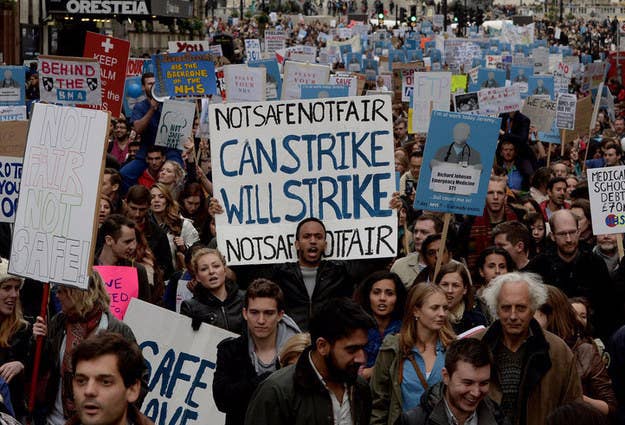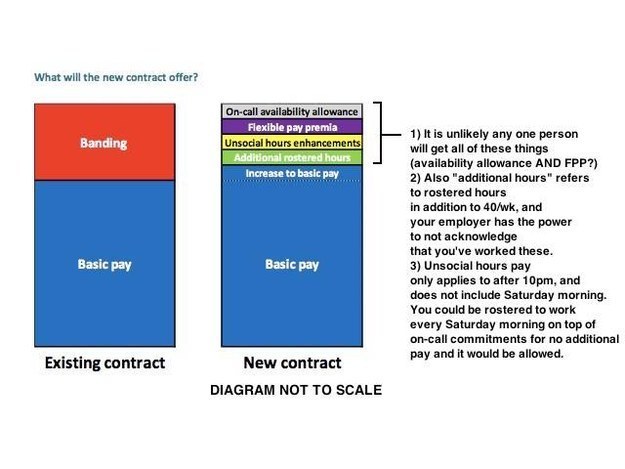Junior doctors are poised to strike over changes to their contracts, amid fears that talks between the government and the British Medical Association (BMA) will fail to produce a satisfactory outcome.

"We're very pessimistic that there's going to be any kind of reasonable movement from the government that will prevent industrial action," Oxford-based junior doctor Rachel Clarke told BuzzFeed News ahead of an expected announcement on the results of negotiations from the BMA today.
Talks over the junior doctors' contract, which would see "sociable working hours" for which doctors are paid a standard rate changed from 7am–7pm Monday–Friday to 7am–10pm Monday–Friday and 7am–7pm on Saturdays, as well as remove annual pay rises, began alongside independent negotiating body ACAS in early December.
While doctors avidly campaigning to prevent the changes became less vocal as negotiations got underway, chair of the BMA's Junior Doctors Committee Dr Johann Malawana, a key figure in the discussions, indicated on Christmas Eve that talks were not progressing well in key areas.
"It is therefore absolutely clear that should we not be able to reach an acceptable outcome by 4pm on 4th January," he wrote in a Facebook post, "the BMA will need to commence serving notice as per its mandate, to the NHS, for industrial action the following week."
Last week, sources told The Guardian that a day of emergency care only by doctors would go ahead on Wednesday 13 January. Claims today that Nick Seddon, David Cameron's health adviser, might make a late intervention in talks to stave off industrial action do not appear to have changed opinions.
"We’re fatigued with the same old games of brinkmanship from the government," Clarke said of the latest apparent developments.
"Ever since this began in July with [health secretary] Jeremy Hunt's first speech on a seven-day NHS, there have been so many moments where an apparent concession has been announced at the eleventh hour, that when you look at it, isn't actually meaningful at all," she added.
In November, while junior doctors were being balloted by the BMA on whether or not they would be willing to go ahead with industrial action, Hunt offered junior doctors an 11% basic pay increase as compensation for the reduced overtime rate they would receive as a result of the change to "sociable working hours", but many felt they would still stand to lose out substantially.
Junior doctor Aoife Abbey, a vocal campaigner against changes to the contract, remained hopeful that an agreement that might prevent the strikes might have been reached.
"I fully expect there to be a new offer – they've had time to come up with one," she told us.
But she too conceded that the fact that doctors are "bracing ourselves for what will come if that's not the case is daunting. As we have said multiple times, striking is not something we want to do."

Another junior doctor, who preferred not to be named, told BuzzFeed News that the medical community was "clearly frustrated that Hunt and the Department of Health are making a last attempt to appease us".
As a result, doctors believe it is highly likely that a day of only emergency care will go ahead next week and beyond, echoing the sentiment of campaigners speaking to The Independent yesterday who said that industrial action could continue all year.
"We have a great deal of resolve and determination to go through with industrial action if we have to. We owe it to our patients and we owe it to ourselves," Clarke told us.
"I will fight for as many days or weeks or months as it takes. If that's what we have to commit to, then so be it."
A spokesperson for the Department of Health said: "As we have consistently said, talks are always better than strikes. We are prepared to talk about anything within the pay envelope, as long as we improve patient safety by moving towards a seven-day NHS."
But others feared that this continued game of political football over doctors' contracts could have the unwanted effect of damaging public opinion.
"It's all been about politicians versus the medical profession," Dr Ben White, one of the junior doctors behind the successful campaign to get the NHS choir to Christmas number one, told us.
"But we want to represent the public's opinion, and I don't think the public is ready to not have an NHS any more."

White felt that "a lot of people are getting quite fatigued with the whole thing, it's becoming quite a drain on people," adding that a key reason for wanting to get the NHS choir into the public eye over Christmas was to remind people of the value of the health service.
"We really want to have some positive upbeat messages," he said.
But he too was poised to take part in next week's expected industrial action.
"Nobody wants to strike, honestly, it's going to be really, really difficult," he told us. "But it looks like it's coming."
